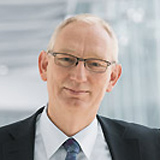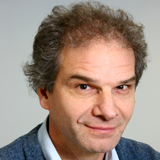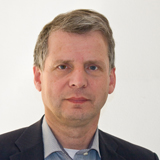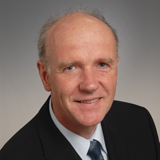General Lectures
(english only)
 |
Prof. Dr. Peter Post |
|
|
Position |
Head of Corporate Research and |
|
|
Institution |
Festo AG & Co. KG |
|
|
Branche |
Automation Technology |
|
|
Origin |
Esslingen, Germany |
|
|
Particulars Dr. Peter Post was born in Haiger, Germany, in 1959. From 1975 to 1978 he completed his apprenticeship as a toolmaker, and in 1980 he started a degree in mechanical engineering at the University of Siegen, Germany, which he finished in 1984. Subsequently, Dr. Post worked as a research assistant in Siegen. He has been employed in the R&D department at Festo AG & Co. KG since 1989. In 2004 he assumed responsibility for applied research and pre-development, and since 2008 he has been head of the corporate research and technology. Dr. Post obtained the German Future Award in 2010. |
||
|
Lecture
Smart Pneumatics for Intelligent Manufacturing
The wide spread applications of pneumatics in all kind of industries are significantly based on the intrinsic advantages of pneumatic components, namely their compactness, robustness, flexibility together with ease of use and cost advantages. Modern pneumatics development is governed by general principles of sustainability, which includes resource efficiency and energy efficiency, by mechatronic system integration, by modular integrated components and miniaturised functions, by communication technologies, distributed intelligence and interface management. The tremendous success of pneumatics is the result of an unbroken innovatory impulse, driven by pneumatic industry and corresponding research institutes together with high end applications in production industry.
The future is actively shaped by intensive efforts and ambitious research projects, driven individually by suppliers and also jointly in pre-competitive areas. The presentations in this section give an overview of current challenging developments driving pneumatics further to future success.
· In valve technology magnetic actuators are state of the art, still going to be developed to advanced performance. New actuator principles – namely piezo technology, shape memory alloys and electro active polymers – are under predevelopment and will give additional chances in special applications.
· Due to the holistic approach of mechatronics and the integration of intelligence and communication features, which are currently discussed in the context of cyber physical systems within the industry 4.0 approach, pneumatic subsystems play an important role in future production technology.
· Optimally criteria based behaviour of pneumatic drives controlled with discrete or proportional valves will give so far unachieved performance for many specialized applications.
· Nowadays the aspect of energy efficiency of pneumatic applications in competition with electric drives is heavily discussed. Here the specific aspects lead to a detailed view of the application itself and gives decision criteria for selection of the right technology. Some research projects, e.g. Green Carbody, show very new results, derived from a detailed analysis of existing production units on shop floor level in automotive industries.
· Pneumatics is perfectly suited for new robotics developments in
the context of direct man machine interaction. The development of the bionic handling assistant derived from bionic principles is an example of the intrinsic compliant behaviour of pneumatic structures. · Furthermore pneumatics needs to be a focus in education, both in professional training and in academic education. New concepts of didactics are important in this context.
All these developments need future research in detailed technical principles as well as research cooperation along the entire value chain. These activities are driven since years by the VDMA fluid power research association and need to be continued at a high level in future.
|
||
 |
Dr. Win Rampen |
|
|
Position |
Founder and Research Director |
|
|
Institution |
Artemis Intelligent Power Limited |
|
|
Branche |
Renewable |
|
|
Origin |
Edinburgh, Scotland |
|
|
Particulars Dr. Win Rampen is a founder and Managing Director of Artemis Intelligent Power which has pioneered the development of the ultra-efficient and controllable Digital Displacement® hydraulic technology. Since its creation in 1994 Win has overseen the growth of Artemis to over 40 employees. Win grew up on a farm near Toronto before training as an engineer. After graduation, he came to the UK in 1978 to work with Professor Stephen Salter and his wave power team at the University of Edinburgh. It was there that he first encountered Robert Clerk and his radical hydraulic machines - which were intended for the Salter Duck's power take-off system. After a few years working as a lecturer in Canada, during the 1980s, Win returned to the University to continue working on the advanced hydraulic machines needed not only for waves but, also, other forms of renewable energy. Win led the project at the University and developed the early prototypes. That work led to a doctorate in 1993 and the creation of Artemis in 1994. Artemis was acquired by Mitsubishi in 2010. Win is a Fellow of the University of Edinburgh, the RSA, the I Mech E and the Royal Academy of Engineers. |
||
|
Lecture The Development of Digital Displacement Hydraulics for Renewable Energy Drivetrains (or Necessity is the Mother of Invention!) In 1974 in the wake of the first global energy crisis the UK began to look at large scale renewable energy sources. Professor Stephen Salter invented a wave energy device now remembered as the Salter Duck at the University of Edinburgh. Digital Displacement® hydraulics came about as a response to the exceptionally difficult problem of converting the slow, irregular, high force motion of ocean waves, to a constant speed rotation to drive a synchronous generator. The rethink of hydraulic power transmission, based on conventional pumping mechanisms and integrated active valves with microprocessor control, has resulted in very controllable fluid-power drivetrains with efficiencies matching, or even exceeding, those of electrical machines. The presentation will cover the early development of the technology and continue to the present where Artemis, now as a subsidiary of Mitsubishi, is assisting in the development of the 7MW SeaAngel offshore wind turbine with a Digital Displacement® driveline at its heart. |
||
 |
Dr.-Ing. Peter Achten |
|
|
Position |
Director |
|
|
Institution |
Innas B.V. |
|
|
Branche |
Fluid Power |
|
|
Origin |
Breda, Netherlands |
|
|
Particulars Dr. Peter Achten is the director and owner of Innas, an engineering and innovation company in Breda, the Netherlands. His background is in mechanical engineering and thermodynamics, having a masters degree (1982) and PhD degree (1996) from Eindhoven University of Technology. He designed and developed several free piston engines, hydraulic components and drive trains. In 2008, the Mechatronics, Informatics & Control Group of the Institution of Mechanical Engineers has awarded him with the Joseph Bramah Medal. |
||
|
Lecture Innovation in The Fluid Power Industry In the coming decade, cost reduction and energy efficiency will be the dominating success factors for any industry. Currently, the hydraulic industry is not fit to meet these demands: hydraulic systems and components are simply too expensive and too inefficient. It is important to mention that there are no fundamental reasons for the poor performance and high manufacturing, production, and engineering cost. Without doubt, hydraulics can be efficient and low-cost. However, the niche market in which the hydraulic industry operates simply does not have an alternative for the hydraulic cylinder. Without feeling the heat of competition, the hydraulic industry has not had enough incentive to invest in new products and technologies. But changes are apparent. Relatively high labour cost already threatens the production industry in Europe and North America. Moreover, the uncertainty about future fuel and energy prices, and CO2 emission demands, will force the industry to change. If it does, it will create unprecedented market opportunities, utilizing the full potential of high power, torque, and force densities, combined with flexibility in control and power management. The fluid power industry really does not have an alternative. It is convicted to innovation. |
||
 |
Univ.-Prof. Dr.-Ing. H. Murrenhoff |
|
|
Position |
Head of Department |
|
|
Institution |
Institute for Fluid Power Drives and |
|
|
Branche |
Fluid Power |
|
|
Origin |
Aachen, Germany |
|
|
Particulars Prof. Murrenhoff is Director of IFAS, RWTH Aachen University. He studied Mechanical Engineering in Aachen and earned his Dr. Degree in 1983. |
||
|
Lecture An Overview of Energy Saving Circuits in Mobile Hydraulics Starting from today’s commercially widespread load sensing systems the general lecture will focus on novel ideas to save fuel in mobile machines. |
||
Wichtige Daten
-
8th – 10th March 2016
10th IFK in Dresden -
19th – 21th March 2018
11th IFK in Aachen
Partner & Sponsors
Ihre Kontaktperson
Dirk Schulze Schencking
Academic Staff/ Wiss. Mitarbeiter
RWTH Aachen University, IFAS
Steinbachstraße 53
52074 Aachen




